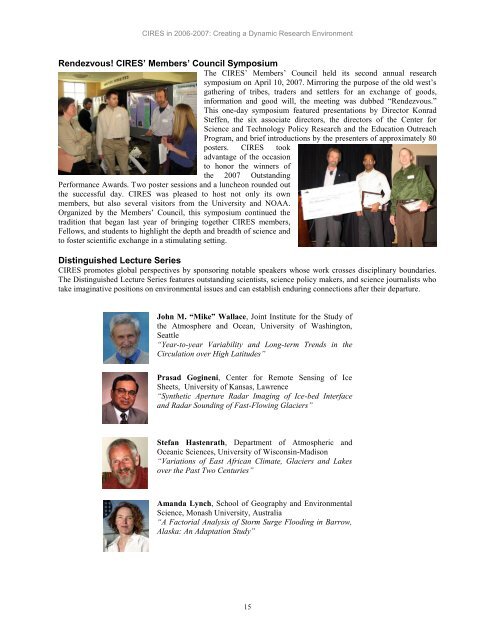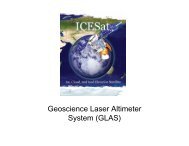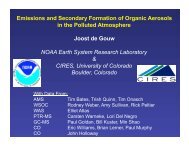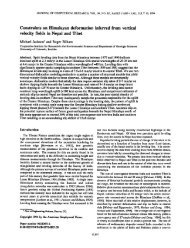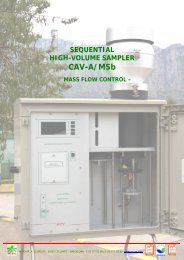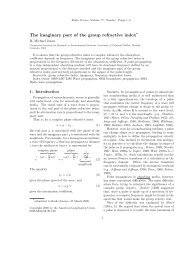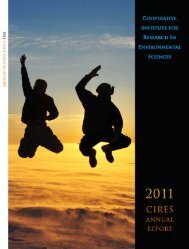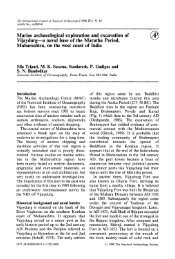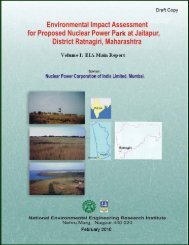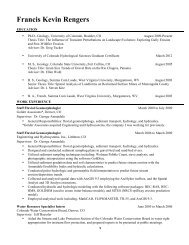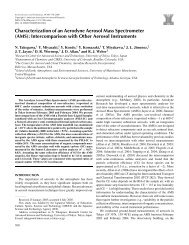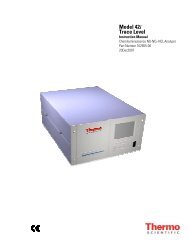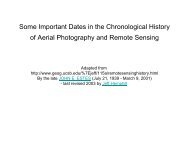Scientific Theme: Advanced Modeling and Observing Systems
Scientific Theme: Advanced Modeling and Observing Systems
Scientific Theme: Advanced Modeling and Observing Systems
You also want an ePaper? Increase the reach of your titles
YUMPU automatically turns print PDFs into web optimized ePapers that Google loves.
CIRES in 2006-2007: Creating a Dynamic Research Environment<br />
Rendezvous! CIRES’ Members’ Council Symposium<br />
The CIRES‘ Members‘ Council held its second annual research<br />
symposium on April 10, 2007. Mirroring the purpose of the old west‘s<br />
gathering of tribes, traders <strong>and</strong> settlers for an exchange of goods,<br />
information <strong>and</strong> good will, the meeting was dubbed ―Rendezvous.‖<br />
This one-day symposium featured presentations by Director Konrad<br />
Steffen, the six associate directors, the directors of the Center for<br />
Science <strong>and</strong> Technology Policy Research <strong>and</strong> the Education Outreach<br />
Program, <strong>and</strong> brief introductions by the presenters of approximately 80<br />
posters. CIRES took<br />
advantage of the occasion<br />
to honor the winners of<br />
the 2007 Outst<strong>and</strong>ing<br />
Performance Awards. Two poster sessions <strong>and</strong> a luncheon rounded out<br />
the successful day. CIRES was pleased to host not only its own<br />
members, but also several visitors from the University <strong>and</strong> NOAA.<br />
Organized by the Members‘ Council, this symposium continued the<br />
tradition that began last year of bringing together CIRES members,<br />
Fellows, <strong>and</strong> students to highlight the depth <strong>and</strong> breadth of science <strong>and</strong><br />
to foster scientific exchange in a stimulating setting.<br />
Distinguished Lecture Series<br />
CIRES promotes global perspectives by sponsoring notable speakers whose work crosses disciplinary boundaries.<br />
The Distinguished Lecture Series features outst<strong>and</strong>ing scientists, science policy makers, <strong>and</strong> science journalists who<br />
take imaginative positions on environmental issues <strong>and</strong> can establish enduring connections after their departure.<br />
John M. “Mike” Wallace, Joint Institute for the Study of<br />
the Atmosphere <strong>and</strong> Ocean, University of Washington,<br />
Seattle<br />
―Year-to-year Variability <strong>and</strong> Long-term Trends in the<br />
Circulation over High Latitudes‖<br />
Prasad Gogineni, Center for Remote Sensing of Ice<br />
Sheets, University of Kansas, Lawrence<br />
―Synthetic Aperture Radar Imaging of Ice-bed Interface<br />
<strong>and</strong> Radar Sounding of Fast-Flowing Glaciers‖<br />
Stefan Hastenrath, Department of Atmospheric <strong>and</strong><br />
Oceanic Sciences, University of Wisconsin-Madison<br />
―Variations of East African Climate, Glaciers <strong>and</strong> Lakes<br />
over the Past Two Centuries‖<br />
Am<strong>and</strong>a Lynch, School of Geography <strong>and</strong> Environmental<br />
Science, Monash University, Australia<br />
―A Factorial Analysis of Storm Surge Flooding in Barrow,<br />
Alaska: An Adaptation Study‖<br />
15


